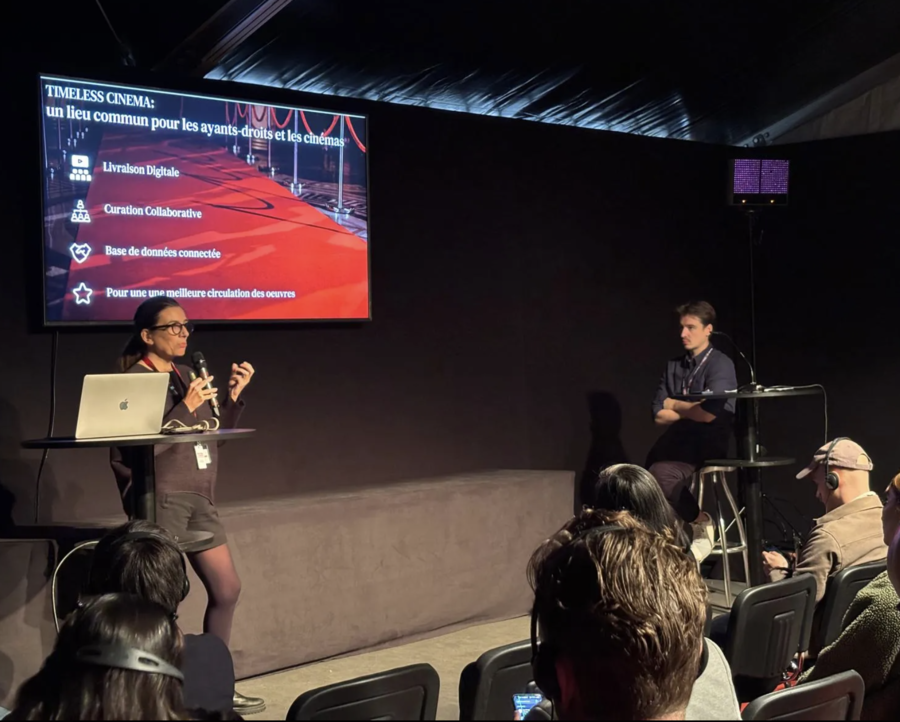INNOVATION PITCHES : Technical solutions from the Classics Innovation Corner for the industry
For the second consecutive year, on Wednesday, October 15, 2025, the International Classic Film Market hosted Pitch Innovation, an event designed to showcase the companies featured in the Classics Innovation Corner, which, in the words of Jules Fournier, innovation consultant and moderator of the event, “are not intended to replace but to modify and even improve work processes.” A total of five companies were presented, using new technologies to address issues facing heritage cinema.

CN Films
Founded in 2003, CN Films develops software solutions for distributors and exhibitors to help promote heritage cinema. Keeping pace with developments in the sector and listening to its needs, CN Films has developed three services, presented by Pierrette Charron and Cécile Pech-Gourg: CINEGO Distri, CINEGO Stock, and CINEGO Ententes. The first is a database for rights holders and distributors, designed to automate the most repetitive and therefore error-prone operations. Consisting of an intelligent and comprehensive interface that lists catalogs, release plans, schedules, and billing tools for setting up PDPs, CINEGO Distri is complemented by CINEGO Stock, which tracks film availability for exhibitors, highlighting trends, while CINEGO Ententes handles management.
Mnemonica
Mnemonica was launched 10 years ago in Italy by Piero Costantini in response to the observation that archives are often locked away in physical format in dilapidated locations, which damages them and disconnects them from the market. It is a highly secure application on which rights holders can store their films for eternity in digital format in a virtual cloud-type space, proving that with advances in restoration, storage is also being rethought. Comprising the works and their material, Mnemonica guarantees secure storage, impervious to risks thanks to double or even triple location of the films, hosted by TMDB and indexed by tags for quick searches. With authorizations, exchanges, and transfers centralized, screenings and deliveries are also facilitated. Ultimately, Mnemonica aims to help preserve and exploit “digital heritage” by bringing it together and reconnecting it to the market.
Phont
Presented by Frederik Merkel, Phont offers emotional subtitles. Its creator sees this innovation as timely, given that projections indicate there will be 2.5 billion hearing-impaired people worldwide by 2050, that the younger generation mostly watches foreign-language content with subtitles, and that more and more people are choosing to consume audiovisual content without sound. Using artificial intelligence to analyze the emotion or intensity of the dialogue in a given piece of content, Phont works by analogy and association, using symbols, and is based on synesthetic studies. This technology is patented and is currently in discussions with platforms to be offered to their audiences. An app will be launched soon, and Phont should eventually be available by subscription or license on all platforms and apps with audio or video content.
Refractio
Described as a solution for archiving works by its founder, Quentin Bitran, Refractio was created in response to limited visibility among professionals and difficult access to specific items within a catalog. Refractio offers a solution to these problems with its semantic indexing and search technology, which uses generative metadata to provide users with a multimodal search engine for film scenes, allowing them to browse a vast corpus quickly and easily using filters tailored to professionals. Supported by the FuturaCinema cultural incubator, a partner of this year's Classics Innovation Corner, and AgoraNov, the company now relies on its institutional partners, including the CNC, and is preparing to launch two simultaneous offerings: Refractio Studio and Refractio Beta.
Timeless Cinema
Drawing on her experience as a rights holder, exhibitor, and programmer, Leslie Vuchot (photo) hopes that Timeless Cinema will forge links between rights holders and theaters and festivals around the world, facilitating access to heritage films for international cinemas and promoting classic cinema. This ambition stems from the observation that exhibitors sometimes find it difficult to identify the rights holders of the films they wish to screen, or even to locate the material and determine who owns it. In response to this, Timeless Cinema aims to bring together as many catalogs as possible in a single international database that also offers collaborative curation and digital delivery of materials, in order to ensure better circulation of classic works. The project is supported by the CNC in its Alpha version and hopes to find new partner theaters at the International Classic Film Market.




